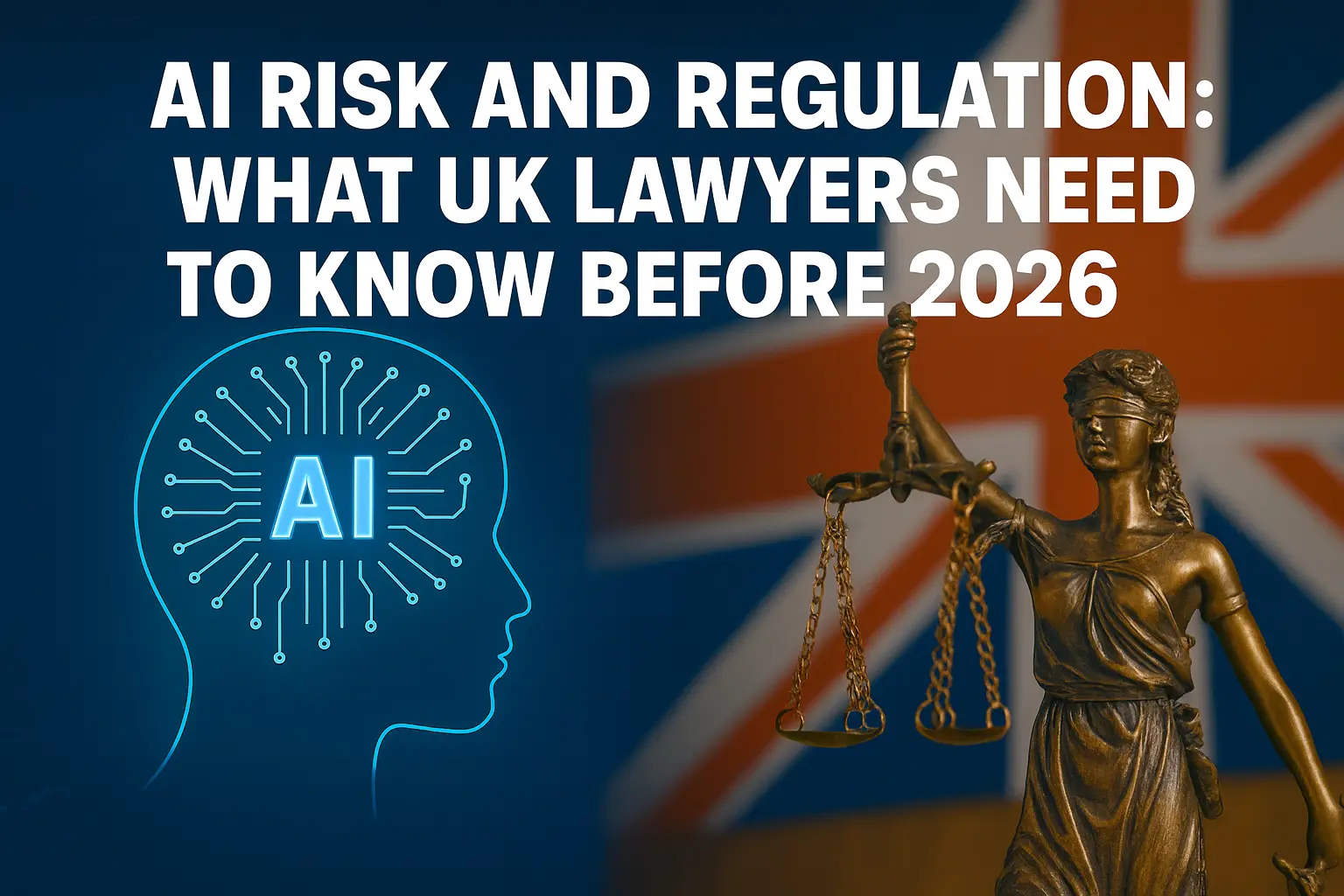
AI Risk and Regulation: What UK Lawyers Need to Know Before 2026
The United Kingdom is charting a deliberate, regulator-led course for artificial intelligence. For law firms, this approach promises flexibility but also complexity.
Rather than following the European Union's AI Act, the UK Government has chosen to delegate oversight to established bodies such as the Information Commissioner's Office (ICO), the Competition and Markets Authority (CMA), the Financial Conduct Authority (FCA), and the Solicitors Regulation Authority (SRA).
The message from Whitehall is clear: innovation should flourish, but it must do so within guardrails of transparency, accountability, and fairness. For UK lawyers, those guardrails are quickly becoming professional obligations.
What Makes the UK's Approach to AI Regulation Unique
The AI Regulation White Paper (2023) and the Government's 2024 policy response confirmed that the UK will regulate AI through existing frameworks rather than a single statute.
Different regulators already cover the areas where AI risk concentrates — privacy, competition, financial integrity, and professional conduct.
By 2026, these principles will solidify into a multi-regulator compliance network. Law firms will no longer point to one "AI Act" but will demonstrate compliance across several intersecting domains. This model offers flexibility but demands deeper governance discipline.
Why AI Risk Demands a Legal-Sector Lens
AI introduces risks that challenge the foundations of legal ethics.
- Confidentiality : Client data processed through machine learning systems can create inadvertent disclosure risks.
- Privilege : Third-party model training or external storage can erode privilege protections under common law.
- Accountability : When an AI-assisted clause or opinion is delivered, the solicitor remains wholly responsible for its accuracy.
- Fairness and bias : The Equality Act 2010 extends to algorithmic assessments used in due diligence or employment screening.
- Professional competence : The SRA Code requires lawyers to maintain competence and supervision when using new technologies.
AI does not replace professional judgement; it tests whether firms can operationalise it responsibly within existing ethical boundaries.
Who Regulates AI Use in the UK Legal Sector
Oversight is emerging through a coordinated, cross-sector network:
- ICO: Defines lawful AI data use, explainability, and accountability. The ICO's Guidance on AI and Data Protection sets out explicit expectations for transparency and human oversight.
- CMA: Investigates foundation models and market power, focusing on transparency in digital markets and algorithmic fairness.
- FCA: Evaluates AI's influence on financial compliance and suitability assessments for clients in regulated sectors.
- SRA: Reinforces that AI adoption must not dilute a solicitor's personal accountability or duty of supervision.
- Law Society of England and Wales and Law Society of Scotland: Encourage AI adoption with caution, emphasising competence and client protection.
This decentralised structure mirrors the profession itself: rule-based, precedent-driven, and context-specific.
How Can Law Firms Prepare for the Coming AI Regulation
Forward-thinking firms are moving from experimentation to formal AI governance frameworks that mirror their data-protection and compliance systems.
- Establish an AI use policy: Define purpose, approval protocols, and prohibited scenarios.
- Protect data and residency: Verify where AI processes client material and ensure UK GDPR compliance.
- Create audit trails: Record prompts, revisions, and human reviews.
- Embed human validation: Require partner or supervisor sign-off before client disclosure.
- Invest in competence: Train staff to identify bias, hallucination, and ethical risks.
- Maintain an incident register: Log and review AI-related errors or data exposures.
Firms unable to produce this evidence by 2026 will find it difficult to defend their compliance posture before clients or regulators.
How Qanooni Aligns with the UK's Regulatory Direction
Qanooni was built for lawyers operating under rising accountability expectations. Every part of its architecture supports traceability, security, and supervision.
- Comprehensive audit trails across every drafting, review, and research action.
- Jurisdiction-aware logic tuned to UK, GCC, and other common-law systems.
- Data residency control via Microsoft's G42 sovereign cloud to comply with UK GDPR.
- Human-in-the-loop oversight preserving supervisory sign-off.
- Native integration with Microsoft Word and SharePoint to keep AI securely within the firm's existing environment.
Together, these features deliver exactly what regulators such as the ICO and SRA are asking for: innovation supported by auditable evidence.
For more on how Qanooni enables lawyers to run AI-assisted drafting safely, read What Is Legal Automation? A Guide for Law Firms in 2025.
What Happens Next
Over the next eighteen months, the UK's framework will mature through regulator coordination, judicial commentary, and amendments to the Data Protection and Digital Information Bill.
The Law Society, the SRA, and the CMA are expected to release additional guidance notes throughout 2025–2026.
Firms that prepare now will not only comply but lead. As clients demand transparency over AI use, demonstrable governance will become a competitive advantage, not an administrative burden.
The question for every law firm is no longer whether to use AI — but how safely to govern it.
Frequently Asked Questions
How will AI be regulated in the UK by 2026?
The UK will use a regulator-led model, empowering the ICO, CMA, FCA, and SRA — alongside devolved Law Societies — to enforce AI principles through existing frameworks.
Can UK lawyers use generative AI for drafting or research?
Yes, if outputs are supervised, privilege is protected, and the SRA's competence and ethics obligations are met.
What should firms prioritise before 2026?
Define AI policies, ensure data protection compliance, and choose platforms like Qanooni that embed governance by design.